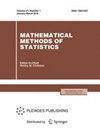A Multiple Hypothesis Testing Approach to Detection Changes in Distribution
IF 0.7
Q3 STATISTICS & PROBABILITY
引用次数: 1
Abstract
Let X1, X2,... be independent random variables observed sequentially and such that X1,..., Xθ−1 have a common probability density p0, while Xθ, Xθ+1,... are all distributed according to p1 ≠ p0. It is assumed that p0 and p1 are known, but the time change θ ∈ ℤ+ is unknown and the goal is to construct a stopping time τ that detects the change-point θ as soon as possible. The standard approaches to this problem rely essentially on some prior information about θ. For instance, in the Bayes approach, it is assumed that θ is a random variable with a known probability distribution. In the methods related to hypothesis testing, this a priori information is hidden in the so-called average run length. The main goal in this paper is to construct stopping times that are free from a priori information about θ. More formally, we propose an approach to solving approximately the following minimization problem:$$\Delta(\theta;{\tau^\alpha})\rightarrow\min_{\tau^\alpha}\;\;\text{subject}\;\text{to}\;\;\alpha(\theta;{\tau^\alpha})\leq\alpha\;\text{for}\;\text{any}\;\theta\geq1,$$where α(θ; τ) = Pθ{τ < θ} is the false alarm probability and Δ(θ; τ) = Eθ(τ − θ)+ is the average detection delay computed for a given stopping time τ. In contrast to the standard CUSUM algorithm based on the sequential maximum likelihood test, our approach is related to a multiple hypothesis testing methods and permits, in particular, to construct universal stopping times with nearly Bayes detection delays.分布变化检测的多假设检验方法
设X1, X2,…是顺序观察到的独立随机变量,使得X1,…, Xθ−1有共同的概率密度p0,而Xθ, Xθ+1,…都按照p1≠p0分布。假设p0和p1是已知的,但时间变化θ∈0 +是未知的,目标是构造一个停止时间τ,以尽快检测到变化点θ。解决这个问题的标准方法基本上依赖于关于θ的一些先验信息。例如,在贝叶斯方法中,假设θ是一个已知概率分布的随机变量。在与假设检验相关的方法中,这种先验信息隐藏在所谓的平均运行长度中。本文的主要目标是构造不受θ先验信息影响的停止时间。更正式地说,我们提出了一种近似解决以下最小化问题的方法:$$\Delta(\theta;{\tau^\alpha})\rightarrow\min_{\tau^\alpha}\;\;\text{subject}\;\text{to}\;\;\alpha(\theta;{\tau^\alpha})\leq\alpha\;\text{for}\;\text{any}\;\theta\geq1,$$其中α(θ;τ) = Pθ{τ &lt;θ}为虚警概率,Δ(θ;τ) = Eθ(τ−θ)+为给定停止时间τ计算的平均检测延迟。与基于顺序最大似然检验的标准CUSUM算法相比,我们的方法涉及到多个假设检验方法,特别是允许构建具有接近贝叶斯检测延迟的通用停止时间。
本文章由计算机程序翻译,如有差异,请以英文原文为准。
求助全文
约1分钟内获得全文
求助全文
来源期刊

Mathematical Methods of Statistics
STATISTICS & PROBABILITY-
CiteScore
0.60
自引率
0.00%
发文量
2
期刊介绍:
Mathematical Methods of Statistics is an is an international peer reviewed journal dedicated to the mathematical foundations of statistical theory. It primarily publishes research papers with complete proofs and, occasionally, review papers on particular problems of statistics. Papers dealing with applications of statistics are also published if they contain new theoretical developments to the underlying statistical methods. The journal provides an outlet for research in advanced statistical methodology and for studies where such methodology is effectively used or which stimulate its further development.
 求助内容:
求助内容: 应助结果提醒方式:
应助结果提醒方式:


